Every time I drive through Caseville, I pass a small building of apartments along M-25. The building has no sign, but cars are parked out front, and sometimes kids’ bikes are there. This building and the apartments must have a commanding view situated on the bluff of the Pigeon River. However, like most buildings in Caseville, it seems that this site was once something else. I found it was once the Caseville Palmer Motel.
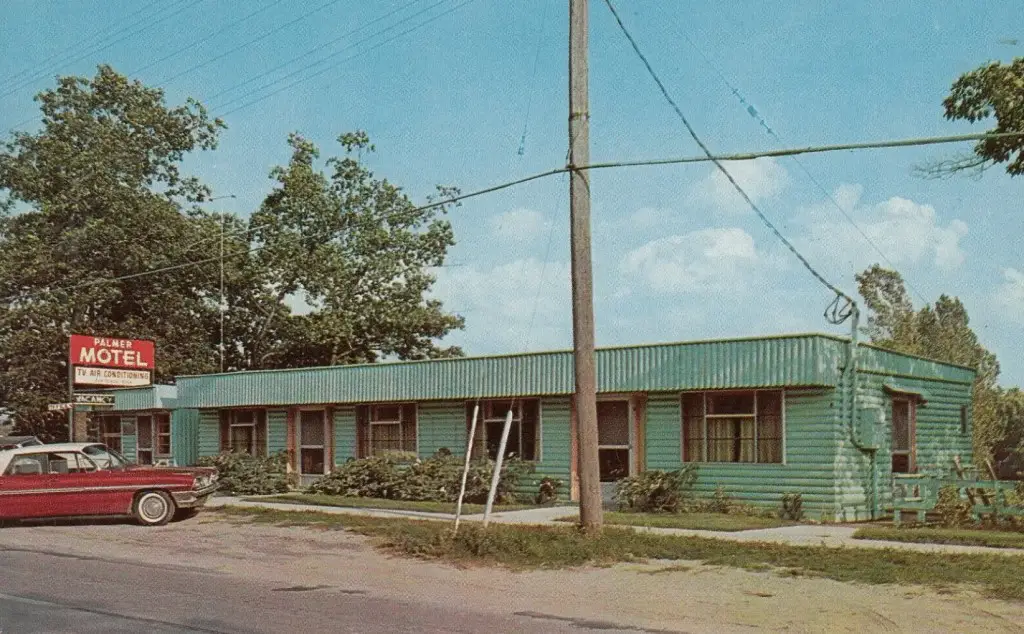
While sorting through images collected while conducting research, I came across this postcard from 1963 showing the Palmer Motel. I never heard of it before. By most standards, it was a small place, but its location across from the Caseville County Park and on the river may have made it appealing for someone visiting the area but didn’t want to camp. If there was a dock on the river, fishermen could keep their boats outback for perch or walleye fishing. It had a rustic look with its log exterior.
Caseville – A Good Place to Vacation
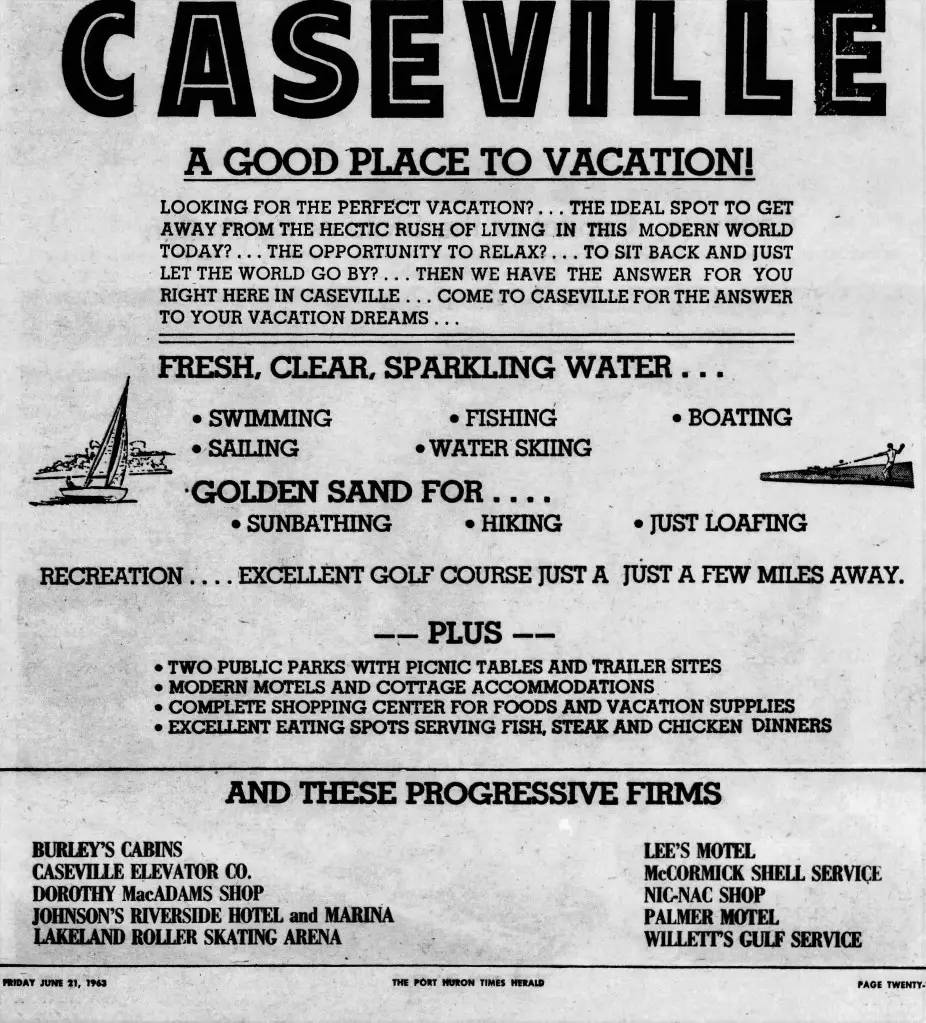
I researched a bit more on the Palmer Motel and unfortunately came up with nothing except this 1963 ad from the Port Huron Times Herald. It was attempting to feature vacationing in Caseville. I think it’s the first time I’ve seen a marketing ad highlighting “Just Loafing” as a thing to do. I’m not sure what “hectic rush” there was to get away from in the “modern world” of 1963. Also, Caseville is a Good, not Great, place to vacation. Maybe the Caseville Chamber of Commerce wrote the ad.
It’s interesting to note all the other Caseville motels and businesses listed and operating as a “progressive firm” in 1963. Will have to look up what that means.
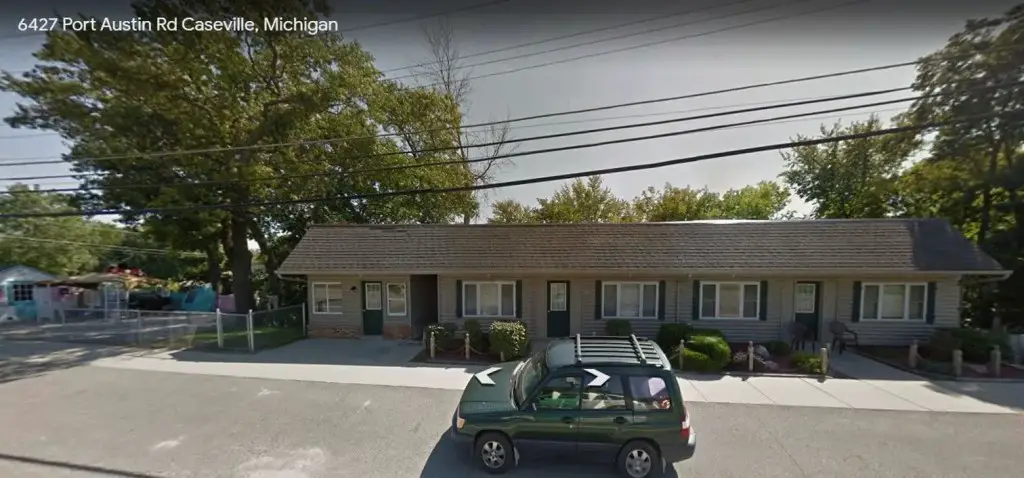
Today, the site is known as Parkview Apartments. The rustic look is now tucked away under siding, and the office and neon sign are long gone. It’s another piece of history that lives on by reinventing itself—some people do that, too.
Other Events That Happened in 1963 in Michigan
In 1963, several significant events occurred in Michigan that shaped its history. One of the most notable was the Detroit Walk to Freedom on June 23, which was the largest civil rights demonstration in the U.S. at that time, drawing an estimated 125,000 participants. Led by Dr. Martin Luther King Jr., the march was organized by Reverend C.L. Franklin (Aretha Franklin’s father) and Reverend Albert Cleage Jr. It addressed issues like segregation, employment, and housing discrimination and served as a precursor to King’s famous “I Have a Dream” speech given later that year in Washington, D.C. More details here and here.
Another notable event was the adoption of Michigan’s new state constitution, a major political development that streamlined government processes and expanded civil rights protections. In sports, the Detroit Lions faced a significant scandal with the suspension of Alex Karras due to a betting issue. Additionally, Gordie Howe of the Detroit Red Wings set a new NHL record for career goals, surpassing Maurice Richard’s previous record. Learn more.
In addition to the Detroit Walk to Freedom and the adoption of Michigan’s new state constitution, other significant events in Michigan in 1963 included the following:
- Sports and Cultural Milestones:
- Alex Karras Suspension: The Detroit Lions’ player Alex Karras was suspended for his involvement in a betting scandal. This was a major sports controversy that affected the team’s reputation and dynamics?(Wikipedia).
- Gordie Howe’s Record-Breaking Goal: Gordie Howe of the Detroit Red Wings set a new NHL record by scoring his 545th regular-season goal, surpassing Maurice Richard’s previous record?(Wikipedia).
- Political Developments:
- William Clay Ford Sr.’s Purchase of the Detroit Lions: On November 22, 1963, William Clay Ford Sr. purchased a controlling interest in the Detroit Lions, significantly influencing the future of the team and its management?(Wikipedia).
- Detroit’s Loss of the 1968 Summer Olympics Bid: Detroit failed in its bid to host the 1968 Summer Olympics, losing out to Mexico City. This was a major disappointment for the city, which had hoped to boost its international profile?(Wikipedia).
- Infrastructure and Public Safety:
- Bridge Collapse: On July 27, 1963, a bridge collapsed into the Clinton River during a golf tournament at the Hillcrest Country Club in Macomb County, injuring 48 people. This incident highlighted concerns about infrastructure safety in the state?(Wikipedia).
- Civil Rights Movement:
- The Detroit Walk to Freedom was a pivotal event that brought national attention to civil rights issues in the urban North, including de facto segregation in schools and housing. This march, organized by the Detroit Council for Human Rights, was instrumental in raising funds and awareness for the Southern Christian Leadership Conference (SCLC) and laid the groundwork for future civil rights activities in the region?(Welcome to Blackpast •)?(Hour Detroit Magazine)?(Michigan Public).
- Economic and Social Changes:
- Automobile Industry and Labor Unions: Michigan continued to be a central hub for the automobile industry. Labor unions like the United Auto Workers (UAW) played a significant role in advocating for workers’ rights and influencing political and social policies during this period?(Wikipedia).
These events, spanning sports, civil rights, politics, and infrastructure, reflect a year of significant change and challenges for Michigan. They contributed to shaping the state’s trajectory in terms of social justice, sports, and political developments.
Related Caseville Palmer Motel Reading and Exploring
- 17 Amusing Things to Do In Caseville Besides the Cheeseburger Festival
- 11 Places to Stay Near Port Austin, Michigan That Are Overlooked by the Big Travel Sites
- Kool Sailboat – 1971 Marketing Genius
- Fun at Caseville Campground Since 1919
- Binge Watch 19 Classic James Bond Films For Free
- 10 Marvelous Great Lakes Beaches You Should Visit & Walk in 2024
- 1913 Great Lakes Storm: The White Hurricane

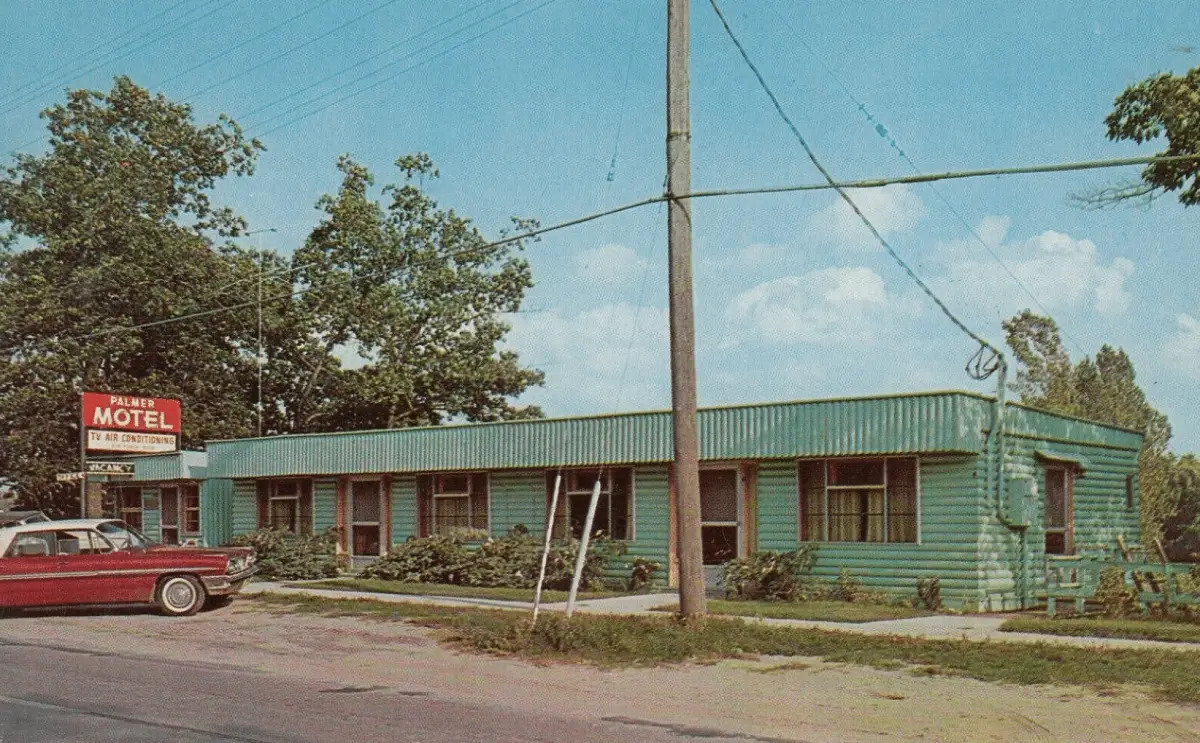

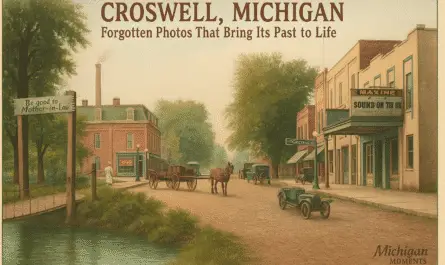


Fascinating, Mike. Thanks for sharing this photo of the Palmer Motel. I remember when it was in business, as I was 13 in 1963. About two doors down was a trampoline business, with maybe four trampolines you could rent by maybe 15 minutes at a time. I think it cost 25c to rent. Then, across the street from the trampolines was / is Caseville’s wonderful Dairy Queen. As you said, most every business in Caseville today was something else yesterday.
But it’s always been a tourist-centric (as they call it, “progressive”) town. I’m sure their definition of “progressive” is the small group who each pitched in probably $10 to pay for that newspaper ad. I’ve sold many of those… 95% of stores say “no” for sure.
Hi Mark, Thanks for those memory updates. I remember the trampoline business. I also remember a restaurant next to the County park entrance that was torn down a long time ago.
That restaurant had several names over the years and was a popular Caseville eatery. Joe Rubino built it, naming it “Chi Chi’s Restaurant” after his daughter, Chi Chi Rubino. She was a star in multiple years of the Caseville Summer Enrichment Program’s Broadway shows in the 1962-67 era — and went on to become Francesca James, on ABC-TV’s “All My Children.” I had the pleasure of being in two plays with her in those years, and, while retired, she’s still in touch with Caseville friends on Facebook.
I have a 1972 story about her from the Detroit Free Press that I’d be happy to post, if possible.
My parents owned and operated the Palmer Motel from 1970 to 1972. The motel’s office is still there. Looks like they extended the roof to cover the office and the rest of the units. The motel was built on a hill. There were six units total; four on the street level and two apartment sized units with kitchenettes and two bedrooms below. The motel office was also living quarters with a living room on the first floor and a bedroom and kitchen in the lower level. The Pigeon River was in the back yard, but we had no dock.
By 1970 the motel sign in the post card was replaced by a bigger neon sign. There was another small motel on the same side of the street about a quarter mile away, called Jungle Land, but it was out of business by 1970. A quick Google maps search shows that it has been demolished.
Thanks Ed,
Appreciate you filling in the details. Very little was found. Do you remember the name of the trampoline place down the street?
I don’t think it had a name. I just remember a sign that said “TRAMPOLINES,”